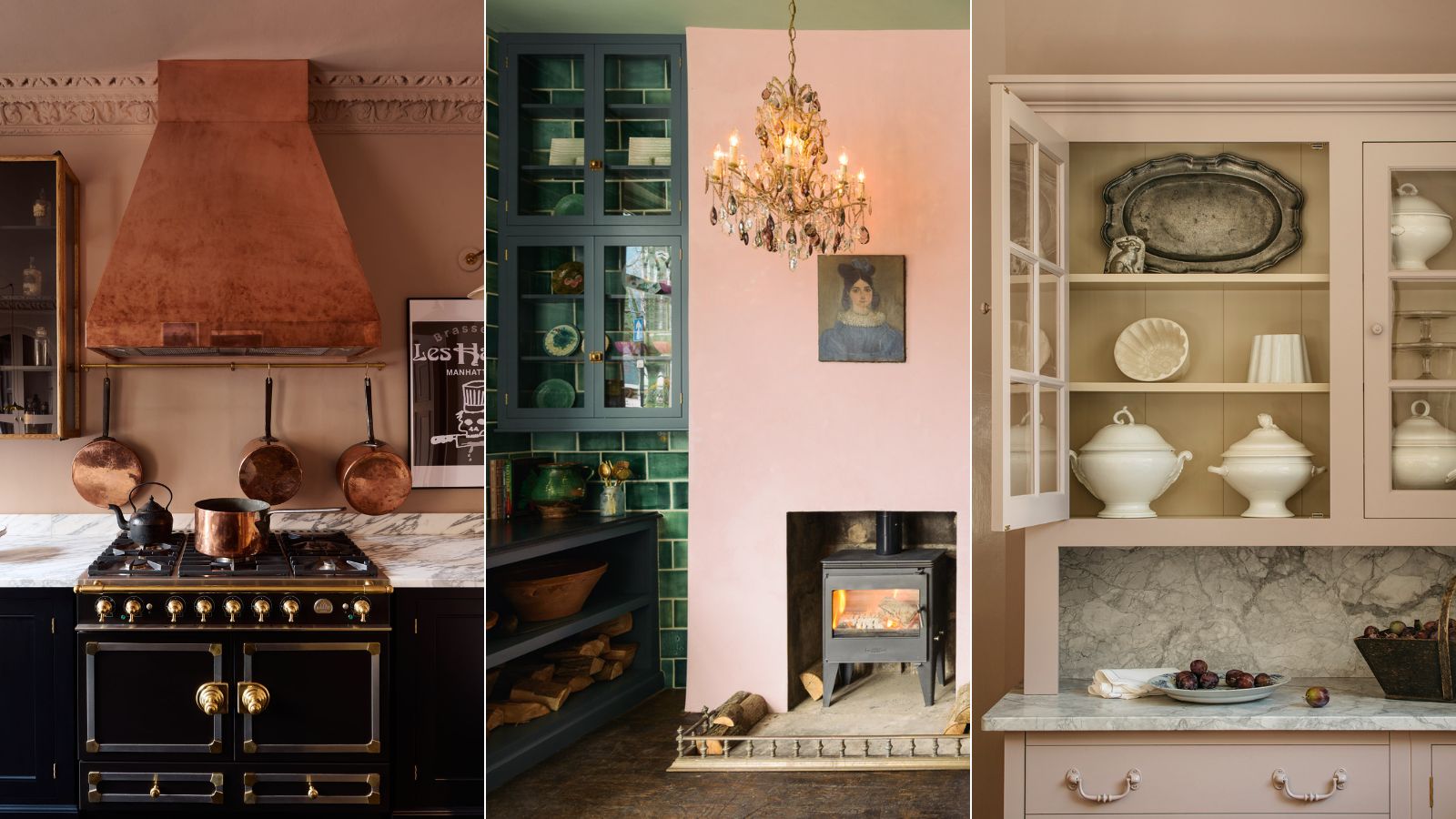
In recent years, nothing has been more romanticized than the quintessential English country cottage. But for those of us not lucky enough to live in an idyllic countryside home, filled with beautiful antiques, period features, and small farmyard animals, perhaps an English kitchen will be enough to satisfy that fantasy.
Thanks to period dramas like Bridgerton and Downton Abbey sweeping viewers the world over off their feet, there is a taste for traditional English kitchen trends in the air. The classic feel, pared-back palette, and rustic charm are designed to bring character and a sense of homeliness into your kitchen.
'English style kitchens are hugely popular when trying to inject some character into your home, whether this be a small quaint or large showstopping space,' says Elizabeth Sherwin, creative director of Naked Kitchens. 'Features such as exposed beams or flagstone flooring naturally inject that traditional feel. However, you can also re-create this style with the clever use of color, materials, and accessories within your design.'
If you want to bring a sense of authentic English style into your kitchen, here’s the full rundown on the hallmarks of an English kitchen, and a glimpse into what characteristics lead interior designers currently coveting.
What is an English kitchen?
When most people think of a traditional English kitchen, they're typically envisioning a Georgian kitchen. Built between 1714 and 1830, a Georgian kitchen has grand proportions, a sense of light and space, a restrained color palette, and a timelessness for function and practicality.
'Inspired by the honest English furniture making of the 18th Century, an English kitchen gains inspiration from Georgian vernacular buildings and the backroom spaces of National Trust houses,' explains Merlin Wright, design director of Plain English Kitchens.
'After the war, English kitchens became more fitted and efficient, particularly in the 1950s when there were far fewer servants available, less wealth and households had to become more self-sufficient,' adds Merlin.
'In recent years, we have seen a shift back to the un-fitted kitchen, with larder cupboards for dry foods, heavy worktables with deep drawers to store pots and pans, open dresser areas for crockery storage, and Belfast or French farmhouse sinks continuing in popularity.'
What does en English kitchen look like?
'At the heart of an English kitchen is its color and kitchen cabinetry style,' says Richard Davonport, managing director at Davonport Kitchens. 'English kitchens are rooted in classical design and encompass many of the design features that we associate with period and premium kitchen design.'
Clean and orderly, but with a warm heart, an English kitchen provides easy access to your daily scullery needs. Think Downton Abbey and their upstairs-downstairs 'back kitchens' used for servants.
'What appeals to so many about English kitchens is their timeless appeal,' Richard adds. 'Done right, they don’t age or date and so provide longevity without having to compromise on style.'
'The color palette tends to feature warm neutrals to create a sense of spaciousness,' says Elizabeth Sherwin. 'Incorporate rustic touches such as mixed materials, a Belfast sink, open shelving, and hanging copper pans from hooks for the classic English look,' she adds.
The 5 characteristics of an English kitchen:
There are several characteristics that, if brought into your kitchen design, will help you to achieve that English-perfect finish. Let's dive in.
1. An organic love of color
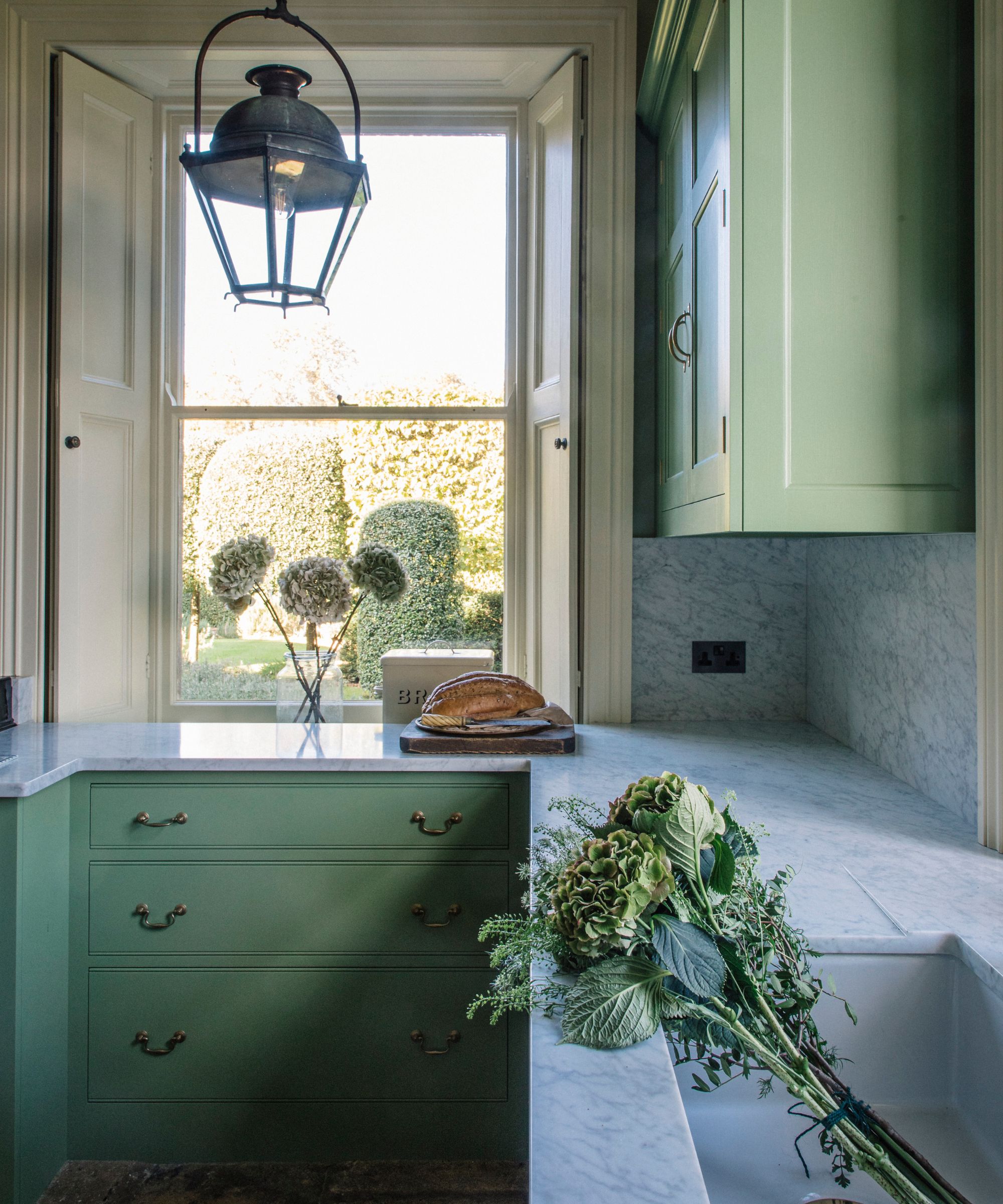
A quintessential Georgian-style English kitchen features painted wooden cabinets and walls in a neutral, organic color palette. While early Georgian color schemes favored bolder hues, later (and mostly popularly) they adopted lighter colors associated with nature such as sky blues, natural beige and stone, and soft greens.
'When I think of a classic English country kitchen, I think of muted tones inspired by nature – heather, sage, dusty rose, and lavender,' says interior designer Kathy Kuo. 'You can evoke that cozy English kitchen feel with antiqued pieces and plenty of rustic charm. Think reclaimed wood, stoneware pitchers filled with seasonal florals, and wall art featuring landscapes.'
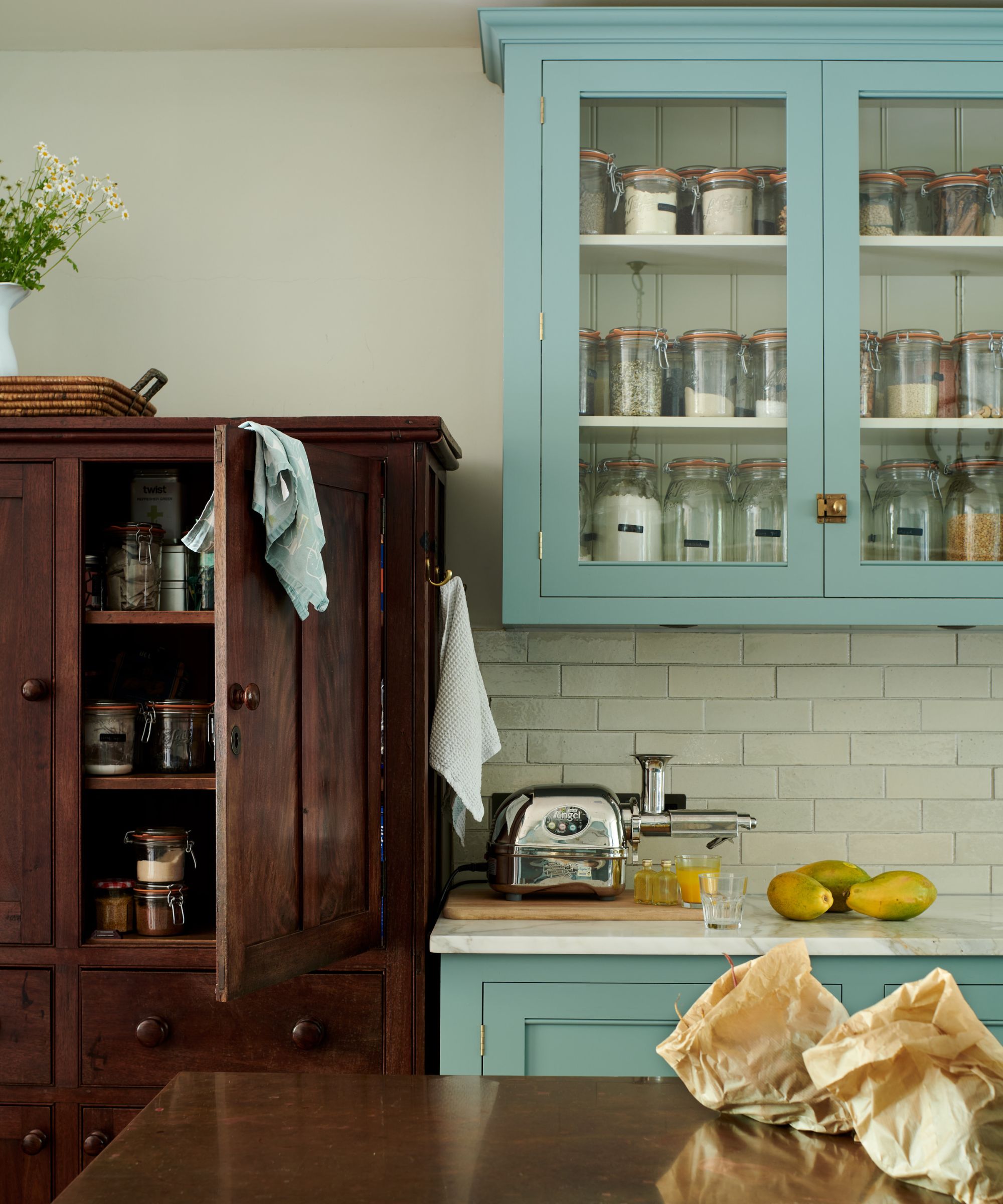
'Kitchen color is so important,' adds Richard Davonport. 'Many of our influences in English design center around the Georgian period and these kitchens were about practicality, rather than a design feature. And so colors were natural and neutral and we still bring this into our approach today.'
'However, our love of color has added a twist to this, whether in the form of using a secondary shade on a kitchen island or in a complementary and understated tone,' says Richard.
2. A furniture-style approach to cabinetry
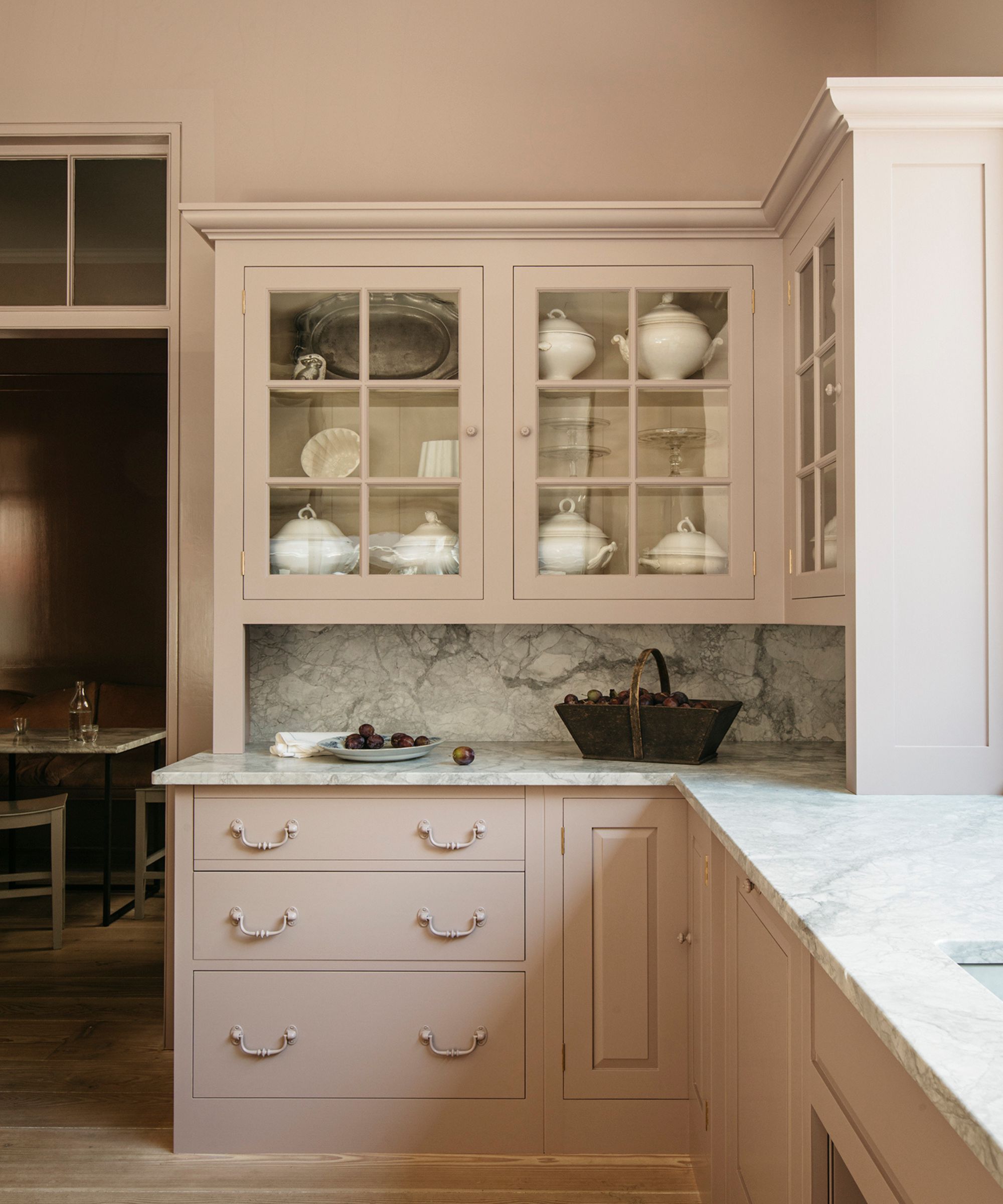
'Cabinetry-wise, it isn’t just about your run of wall or floor cabinets but about taking a bespoke approach to make your kitchen to make it feel like it is filled with furniture,' says Richard Davonport. 'This may be in the form of a beautiful stand-alone cupboard or a full-height hutch that is painted in the same colors so that it fits into the space but feels bespoke and unique to your home,' he adds.
Rather than focussing on how many cabinets you can fit in the space, an English kitchen is all about open space with freestanding cabinets often used as display pieces like dresser units, coffee stations, and pantry storage.
Plain English Kitchens' Merlin Wright agrees. 'Designing with proper cupboards rather than kitchen units helps to create the feeling of a ‘comfortable room’ not a fitted kitchen.'
'People enjoy cooking food at home in a welcoming, more emotional environment while sharing with friends and family so an English family kitchen needs somewhere to sit, a couple of stools at an island, or a table and chairs for informal eating,' Merlin adds.
3. Pantries and larder storage
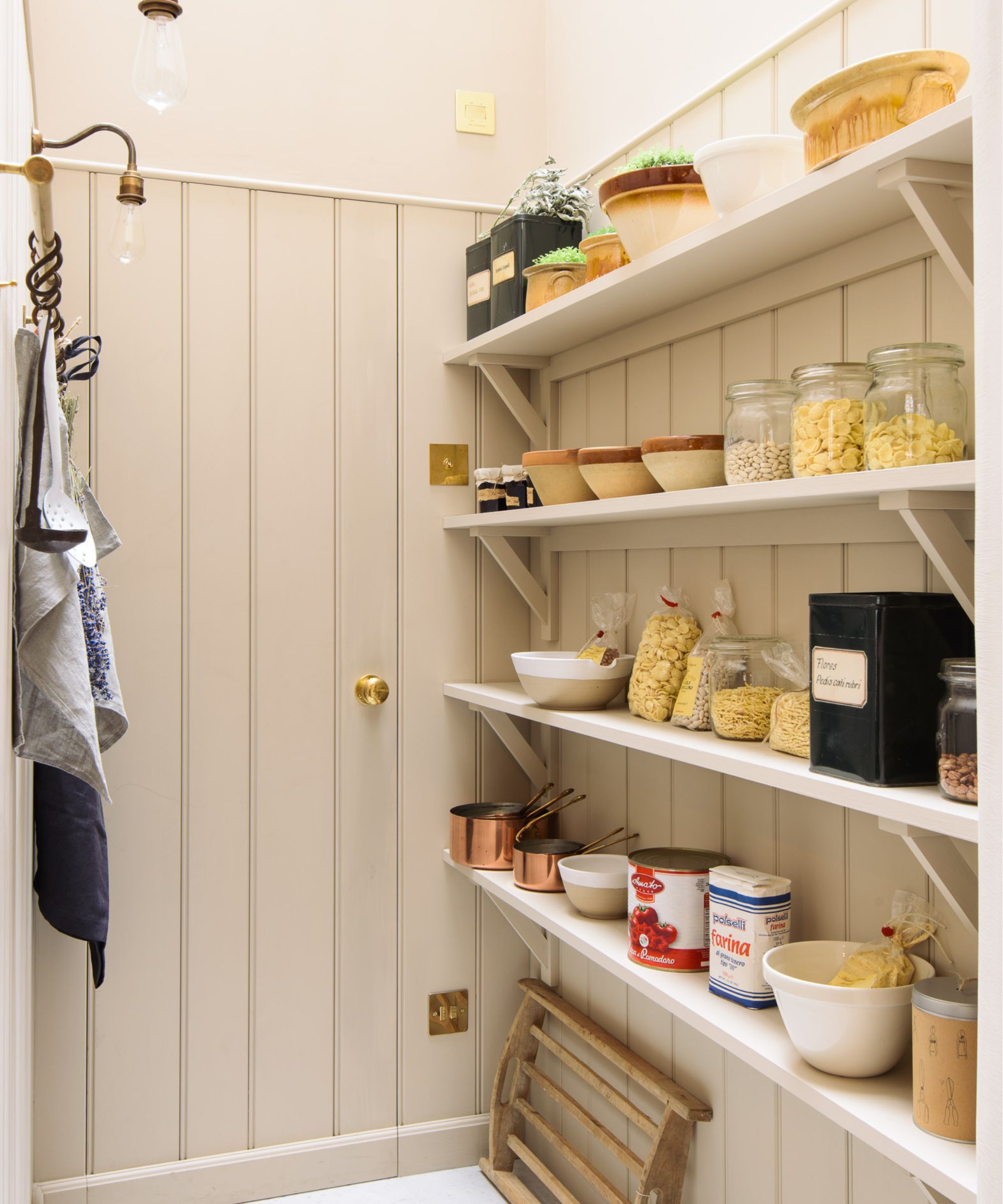
Before fridges became commonplace in traditional English kitchens, the larder or pantry provided a space to keep perishable food items cool. Originally, it would have been an entire room made of stone, decked out in wooden shelving, and of course: well-ventilated.
'Main of the ‘wish-list’ items we get asked for when designing a new kitchen are routed in English kitchen design,' observes Richard Davonport. 'Pantries have overtaken everything else we get asked for at the moment, whether a dedicated room or large pantry cupboards,' he adds.
'An English kitchen sits at the heart of the home, with a returning influence of the downstairs spaces in grand houses with scullery areas, butler’s pantries, and larders,' says Merlin Wright. 'Larger spaces can sometimes be divided with semi-glazed screens to make a separate storage room for pulses and dry goods, a wet scullery for dirty dishes to keep the main kitchen clear and functioning during busy family life.'
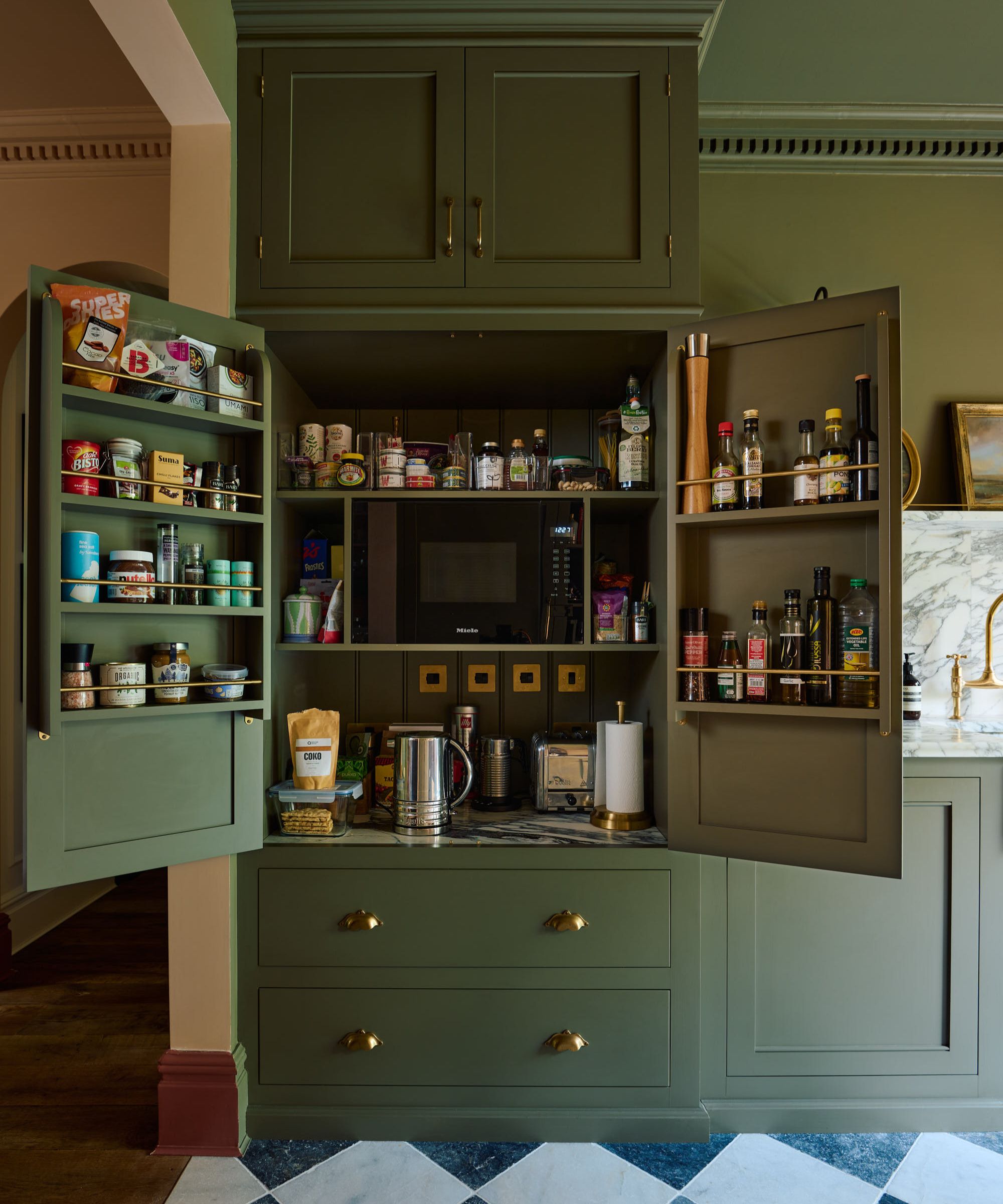
'A pantry is very traditional, whether it’s a big cupboard or a room. It has come in and out of fashion as people lean towards fully fitted rooms with floor-to-ceiling and wall-to-wall cupboards, but for us, it is one of the quintessential parts of a classic English kitchen,' adds deVOL's creative director Helen Parker.
'They're so practical and so easy to manage with everything stored together in one place to make it easily accessible. It also harks back to the days of less is more, as it treasures the household and family objects as pieces of importance, pieces that need to be held onto and stored together in the pantry,' she adds.
4. The use of traditional and antique materials
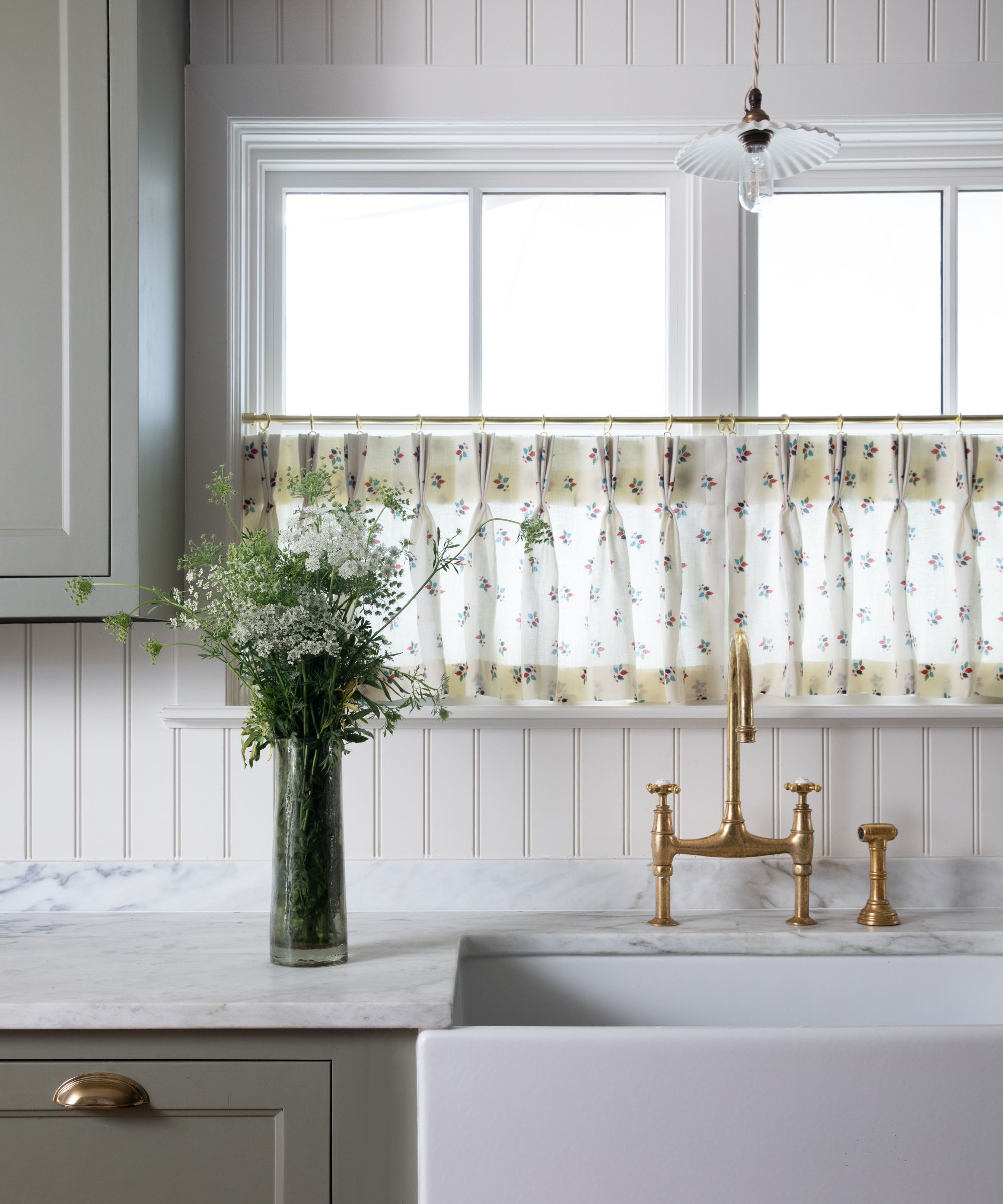
In traditional kitchens rustic wood and stone were the building blocks. Incorporate these materials into your kitchen design to capture that lived-in, homely feel.
'Colors and utilitarian aspects are the benchmarks of classic English kitchens,' says interior designer Shannon Eddings. 'Think pot racks, apron front sinks, some color and a little bit of pattern, and an old stone floor.'
In the kitchen above, designed by Shannon, they used reclaimed Saltillo tile on the floor and color drenched the cabinetry in a rich green color. 'Marble countertops make it very classic and are a nod to one of the oldest stones that exist. The sink is apron-front and we did a classic pinch pleat cafe curtain above it to mimic a European cafe feel.'

If you're looking to incorporate some more contemporary finishes like marble and stone, look for a honed, low-luster polish finish and embrace a reclaimed patina with unlacquered metalwork (including your faucet) and antique or even preloved accessories. Patina is key to a well-loved, collected-over-time look.
'English kitchens epitomize excellence in traditional woodcraft and cabinets,' adds designer and founder of Arsight, Artem Kropovinsky. 'Wooden flooring, marble countertops, and ceramic tiles are key materials to create an atmosphere where there is an emphasis on coziness. The warm friendly vibe is enhanced by low, indirect lighting.'
5. Classic appliances make a focal point

The stove is at the heart of an English kitchen and serves as the focal point for the kitchen, for all the congregate around. In a very traditional, country English kitchen, you'll find a cast-iron AGA range or Rangemaster occupying real estate in between classic cabinetry.
'An English kitchen is a place that you will actually cook, and is not designed around show, except for when it comes to the ranges...' says designer Anne-Marie Barton of AMB Design. 'Not only must they work well, they must deliver a luxury vibe. A la Cornue, La Canche, or a Bertazzoni are often found in the homes I design when I want to convey my client’s joy of cooking,' she adds.
'Prioritize a traditional range oven if you can, it’s the focal point to many an English kitchen and will evoke the warm and welcoming atmosphere synonymous with this style,' adds Naked Kitchens' Elizabeth Sherwin.
A traditional English kitchen is formed by the kitchens and pantries of the past. Think about implementing these expert-approved characteristics in your own home - like muted painted wooden cabinets, a farmhouse sink, and vintage-style appliances. Create a timeless, homely, and rustic appeal within the heart of your home.







